|
Don’t miss episode 72 of the Let People Prosper show with guest Avik Roy, president of the Foundation for Research on Equal Opportunity (FREOPP).
We discuss America’s biggest economic problems and how to solve them. Avik and I discuss the following and more:
Check out the full show notes at my Substack newsletter and subscribe to get my posts directly in your inbox.
0 Comments
To show my gratitude this Thanksgiving, I am offering a limited-time special giveaway to one lucky winner!
I hope you all had a wonderful holiday yesterday, and thank you for tuning in to today’s 36th episode of “This Week’s Economy.” This episode includes a special opportunity for one of you to win a complimentary year-long subscription to this newsletter, which is essential in light of my transitioning to a paid format soon. Click the link to enter the giveaway. Texas lost jobs in October and faces major headwinds with a weak U.S. economy and a poor performance by this year’s 88th Legislature. There is a better way.
Free-market capitalism is the best path to let people prosper, as it is the best economic institution that supports jobs and entrepreneurship for more people to earn a living, gain skills, and build social capital. Table 1 shows Texas’ labor market for October 2023 from the U.S. Bureau of Labor Statistics. These data compare the following important dates: 1) June 2009—Dated trough of that U.S. recession, 2) February 2020—Dated peak of the last U.S. expansion before the COVID-19 shutdowns, 3) April 2020—Dated trough of the last U.S. recession, and 4) October 2023—Latest data available. The labor market declined last month continuing a weakening trend in Texas.
The economy continues to expand in Texas though there are headwinds.
As Texans face an affordability crisis from high inflation and high property taxes and an uncertain future with the U.S. economy likely in a deepening recession, the Legislature provided some tax relief but not nearly enough because of excessive spending.
Strengthening the Texas Model will help Texans better resist D.C.’s overreach, be more competitive with other states, and, more importantly, flourish more for generations to come. Don’t miss episode 71 of the Let People Prosper show with Dr. Norman Horn, president of the Libertarian Christian Institute and co-author of “Faith Seeking Freedom.”
We consider controversial questions to help Christians understand how to glorify God in the marketplace. Dr. Horn and I discuss the following and more:
Originally published at Econlib.
President Biden signed a sweeping executive order to “harness” and “keep” artificial intelligence, two words you never want to hear from the government. This new regulation will inhibit Americans’ flourishing because restricting free markets never works. The EO is reported to ensure safety, equity, and responsible development. While these goals may appear laudable, delving deeper reveals that this motion will hinder economic progress and stifle the innovation it aims to promote. That’s why policies must always be judged by their results rather than their intentions. Details of the order’s objectives include safety tests, industry standards, and government oversight to address potential risks associated with AI. Forcing AI companies to conduct safety tests before going public, known as “red teaming,” will significantly slow the development and deployment of AI technologies. It’s well-established that innovation thrives in an environment of minimal regulatory interference called “permissionless innovation.” So introducing these bureaucratic hurdles will hinder fast-growing AI and all the industries that have begun to rely on it. Medicine and biotech, in particular, have realized remarkable potential with AI that has life-saving ramifications. But Biden’s overreaching EO wants to harness that. As is the case with many regulations, the EO comes at not just a cost to the individuals it affects but to the government’s pocketbook as well. As part of its endeavor to “preserve individuals’ privacy,” the administration will fund the Research Coordination Network. At a time when wages aren’t keeping pace with inflation and the average American family is losing real money due to a suffering economy, the government adding an expense like this is an insult to injury. Congress needs to reduce spending, and the Fed needs to slash its bloated balance sheet now more than ever. One of the most troubling aspects of the EO is its emphasis on regulating AI in the workforce out of concern for the technology displacing workers. Although there has been some uproar out of concern over AI destroying jobs, research shows that only 34% of Americans fear job displacement due to AI. And for good reason. Not only now but historically, concerns about new technologies displacing workers have been overblown. A Harvard paper published in 2013 predicted that by 2023, almost half of all American jobs would be replaced by AI. Clearly, the calculation has not come to pass. That’s because technology is a tool, not a threat. Frequently, implementing AI and technology like it allows humans to do more complex or human-facing jobs that AI can’t do or that people don’t want AI to do. AI is a transformative technology that has the potential to revolutionize various industries, from healthcare to finance and beyond. In a free market, competition drives innovation and efficiency, benefiting consumers and businesses. Restricting AI through excessive regulations and government oversight threatens this dynamic. While the intention behind Biden’s EO on AI may be to ensure responsible development and safe use, the economic consequences could be dire. To maintain America’s leadership in AI and foster economic growth, lawmakers and leaders must avoid overregulation and unnecessary restrictions on this transformative technology. Instead, we should encourage innovation, protect intellectual property, and ensure that AI remains a powerful tool for driving economic prosperity and improving the lives of all Americans. In the fast-paced world of technology, the last thing we need is government interference that hampers progress. President Biden signed a sweeping executive order to “harness” and “keep” artificial intelligence, two words you never want to hear from the government. This new regulation will inhibit Americans’ flourishing because restricting free markets never works.
The EO is reported to ensure safety, equity, and responsible development. While these goals may appear laudable, delving deeper reveals that this motion will hinder economic progress and stifle the innovation it aims to promote. That’s why policies must always be judged by their results rather than their intentions. Details of the order’s objectives include safety tests, industry standards, and government oversight to address potential risks associated with AI. Forcing AI companies to conduct safety tests before going public, known as “red teaming,” will significantly slow the development and deployment of AI technologies. It’s well-established that innovation thrives in an environment of minimal regulatory interference called “permissionless innovation.” So introducing these bureaucratic hurdles will hinder fast-growing AI and all the industries that have begun to rely on it. Medicine and biotech, in particular, have realized remarkable potential with AI that has life-saving ramifications. But Biden’s overreaching EO wants to harness that. As is the case with many regulations, the EO comes at not just a cost to the individuals it affects but to the government’s pocketbook as well. As part of its endeavor to “preserve individuals’ privacy,” the administration will fund the Research Coordination Network. At a time when wages aren’t keeping pace with inflation and the average American family is losing real money due to a suffering economy, the government adding an expense like this is an insult to injury. Congress needs to reduce spending, and the Fed needs to slash its bloated balance sheet now more than ever. One of the most troubling aspects of the EO is its emphasis on regulating AI in the workforce out of concern for the technology displacing workers. Although there has been some uproar out of concern over AI destroying jobs, research shows that only 34% of Americans fear job displacement due to AI. And for good reason. Not only now but historically, concerns about new technologies displacing workers have been overblown. A Harvard paper published in 2013 predicted that by 2023, almost half of all American jobs would be replaced by AI. Clearly, the calculation has not come to pass. That’s because technology is a tool, not a threat. Frequently, implementing AI and technology like it allows humans to do more complex or human-facing jobs that AI can’t do or that people don’t want AI to do. AI is a transformative technology that has the potential to revolutionize various industries, from healthcare to finance and beyond. In a free market, competition drives innovation and efficiency, benefiting consumers and businesses. Restricting AI through excessive regulations and government oversight threatens this dynamic. While the intention behind Biden’s EO on AI may be to ensure responsible development and safe use, the economic consequences could be dire. To maintain America’s leadership in AI and foster economic growth, lawmakers and leaders must avoid overregulation and unnecessary restrictions on this transformative technology. Instead, we should encourage innovation, protect intellectual property, and ensure that AI remains a powerful tool for driving economic prosperity and improving the lives of all Americans. In the fast-paced world of technology, the last thing we need is government interference that hampers progress. Originally published at Econlib. Today, I cover:
New Hampshire has displaced Florida as the most economically free state, according to the Fraser Institute’s new Economic Freedom of North America report. The findings demonstrate that, while size and location account for some of a state’s success, free-market friendliness is everything.
This annual report, now in its nineteenth edition (one of us is its lead author), offers a comprehensive analysis of economic freedom using 2021 data (the most recent available). The report defines economic freedom as “the ability of individuals to act in the economic sphere free of undue restrictions.” The top five states in the report are what one might expect. Unsurprisingly, these top five states tend to spend less, do not have a personal income tax, and have reasonable labor market regulations. New Hampshire improved its economic freedom score from 7.92 to 7.96 to retake the top spot after losing it in the prior year. Florida fell from the top as it dropped from 7.97 to 7.80. Tennessee declined from 7.85 to 7.73 for third place. Texas inched down from 7.67 to 7.64, and South Dakota fell from 7.73 to 7.59. Conversely, the least economically free states were New York (4.09), California (4.27), Vermont (4.27), Oregon (4.56), and Hawaii (4.58), all of which lost ground since the last report. Each state has some of the highest rates of taxation and government spending, as well as stringent labor market regulations. In the freest quartile of states, the population grew on average by one percent in 2022, compared to a 0.1 percent decline in the least free quartile. Americans are voting with their feet in favor of economic freedom, fueling the flood of California and New York refugees pouring into Texas and Florida. Furthermore, hundreds of research papers have used the index, almost universally finding that more economic freedom correlates with positive outcomes such as higher incomes, faster income growth, lower unemployment, and more entrepreneurial activity. Bluntly, states with less government spending, lower taxes, and less burdensome labor market regulations have more opportunities for people to flourish. While the report has many compelling findings, two states stand out: New Hampshire and South Dakota. New Hampshire has embarked on a journey of economic liberation in recent years. In 2021, the state had significantly reduced taxes and had begun its ongoing quest to abolish interest and dividends taxes, a huge step toward reducing the tax burden. While the state’s taxes are already relatively low, they continue to decline. New Hampshire does not have a state minimum wage, reducing labor market regulations allowing wages to be market-determined instead of government-mandated. This helps attract young people and others with less experience, training, or education. As a result, household incomes in the Granite State are among the highest in America. Consistently, states with low minimum wages draw more people than average, while states with high minimum wages — California, New York, Illinois — are experiencing out-migration. Not only businesses, but also parents and students in New Hampshire have seen their freedom expand through school choice, which will help improve economic outcomes. In its commitment to providing school choice for all, the state has implemented education freedom accounts. These accounts empower parents to make educational choices that best suit their children’s needs while promoting a competitive schooling landscape that benefits teachers and students. South Dakota, too, has made remarkable strides in economic freedom, which became particularly evident during the challenging times of the COVID-19 pandemic. In 2021, the state was an exemplar of resilience and recovery, boasting the lowest unemployment rate in the country after the pandemic hit. Its output recovered pre-pandemic levels before any other state, with its real GDP growing by nearly five percent. Fortunately, the state never issued stay-at-home orders or mask mandates. Instead, state leadership allowed individuals to make decisions concerning personal health and safety, a common theme that has assisted the state’s flourishing. One key factor contributing to South Dakota’s economic success is its unique tax policies. The state is a rare tax haven with no corporate or personal income taxes and no durational limits on trusts. By allowing families to hold wealth indefinitely within trusts, and letting earners keep more of their hard-won incomes, South Dakota has remained a top spot for entrepreneurs. This tax-friendly environment in South Dakota reaffirms a fundamental economic principle: spending and taxes influence individual choices. As evidenced by the state’s success, people gravitate toward regions with lower tax burdens and more favorable financial policies. The success stories of New Hampshire and South Dakota underscore the power of economic freedom in fostering human flourishing. In a society where consumers are free to choose, businesses must continually improve the quality and affordability of their products and services. This dynamic situation fuels increased productivity and benefits everyone in the economy. Economic freedom isn’t just about lower taxes. It encompasses a broader spectrum of policies that allow individuals to make decisions about their lives, finances, and education. It’s about governments empowering people with opportunities rather than restricting or directing activity. By following New Hampshire and South Dakota’s lead, other states can unleash the power of economic freedom to boost investment, create jobs, improve human flourishing, and make their regions more competitive and attractive places to live. In a world where economic challenges are ever-present, these states serve as beacons of hope, proving that less government spending, lower taxes, and reduced labor market regulations can pave the way to a brighter economic future, full of greater opportunity for all. Originally published at Daily Caller. Originally published at American Institute for Economic Research.
The rise of several underdog states and the fall of previous favorites tells the story of the Tax Foundation’s new 2024 State Business Tax Climate report. The findings support how less government contributes to more flourishing, while heavy-handed taxes hinder prosperity. The scores for the 50 states in the report declined by 0.19 points from the prior report, indicating a less overall competitive business tax climate nationwide. Considering that half of all states have cut taxes over the past three years, and an increasing number are moving to flax taxes, pressure is building on states to seek tax cuts or risk getting left behind. An inspiring success story is Iowa, which has emerged as a beacon of pro-growth tax reform. Iowa reduced its top marginal individual income tax rate from 8.53 to 6.0 percent. By consolidating its previous nine tax brackets into four, the newer, more streamlined tax system is less burdensome for Iowans. Another improvement in Iowa’s reforms was reducing the marriage penalty. The state removed a longstanding tax burden by doubling the bracket amounts for married couples filing jointly. The state also shifted its previously three-bracket corporate income tax structure into just two brackets, which caused the top rate to drop by 1.4 percentage points. As a result of these changes, Iowa’s ranking improved from 38th to 33rd in just one year. While there’s room for improvement, the state is on a better path. Considering the conservative budgeting by Governor Reynolds and the legislature, and the transition to a flat 3.9 percent income tax rate by 2026 and a flat corporate income tax rate of 5.5 percent, the state could soon be on its way to 15th place. Massachusetts, on the other hand, experienced the sharpest decline of all the states, plummeting 12 places down to 46th. This regression in business tax competitiveness can be largely attributed to a new state constitutional amendment. It transitioned Massachusetts from a single-rate to a graduated-rate income tax system with a new 4 percent surtax for a top marginal tax rate of 9 percent for incomes over $1 million. This progressive policy not only represents a departure from the trend of rate reductions and bracket consolidation in other states as part of the flat tax revolution, but also introduces a significant marriage penalty. While implementing a new payroll tax further contributed to Massachusetts’s decline in tax competitiveness, the state’s individual tax component ranking fell from 11th to 44th. Unfortunately, this fall was foretold by the vast number of people fleeing the state, many of whom were no doubt searching for a more tax-friendly place of residence. After all, people vote with their feet. While Massachusetts experienced a sharp fall, Mississippi and Idaho emerged as rising stars in the world of tax reform. Mississippi’s ranking jumped from 27th to 20th thanks to three major shifts. It became the second state to implement permanent full expensing for select investment in machinery and equipment, passed a flat personal income tax, and will soon phase out its franchise tax. These forward-thinking policy changes encourage investment and economic growth, positioning Mississippi as a more competitive business destination. Likewise, Oklahoma has also made significant strides in tax reform. In addition to eliminating its marriage penalty, the state reduced its split roll ratio in property taxation and withdrew its capital stock tax. These actions propelled its property tax component ranking to substantially improve from 30th to 15th. As a result of these reforms, Oklahoma’s overall ranking has risen significantly, now at 19th. And while Governor Stitt’s recent special session was unsuccessful in making bigger strides for tax cuts, the state looks poised to do so soon, thereby improving its competitiveness. On a similar path, Idaho made a noteworthy move by transitioning from four brackets to a flat individual income tax at 5.8 percent. Additionally, the state cut its corporate income tax rate to 5.8 percent, further enhancing its tax competitiveness. These reforms boosted its individual tax component rank by two places, now at 17th. The findings from the Tax Foundation’s report underscore a fundamental economic truth: Free markets do not discriminate. They thrive where they are permitted to flourish, and that starts with sustainable budgeting and sound tax policy. States like Iowa, Oklahoma, Mississippi, and Idaho, which prioritize tax cuts and financial freedom, are poised to rise in the rankings and could quickly become some of the more sought-after states. As they continue to reduce tax burdens, they create environments where individuals and businesses can retain more of their earnings, which invites innovation, improves the quality of life, and encourages moving to those states. Meanwhile, states like Massachusetts and New Jersey, which ranks 50th in the report, choose high spending and taxes that will contribute to continued out-migration as individuals and businesses seek refuge in states prioritizing economic freedom. The message is unmistakable. Free markets work, and policymakers should heed the lessons from these tax climate rankings. There’s much to every person’s journey. Mine has many cycles that made me the man I am today. The video above and the document below tells my story of a key cycle that highlights a peak, trough, and subsequent peak on the anniversary of this life-changing event. I've included pictures throughout that will hopefully give you a good perspective. Moral of the story: Even “rockstars” can make a difference! #LetPeopleProsper The rise of several underdog states and the fall of previous favorites tells the story of the Tax Foundation’s new 2024 State Business Tax Climate report. The findings support how less government contributes to more flourishing, while heavy-handed taxes hinder prosperity.
The scores for the 50 states in the report declined by 0.19 points from the prior report, indicating a less overall competitive business tax climate nationwide. Considering that half of all states have cut taxes over the past three years, and an increasing number are moving to flax taxes, pressure is building on states to seek tax cuts or risk getting left behind. An inspiring success story is Iowa, which has emerged as a beacon of pro-growth tax reform. Iowa reduced its top marginalindividual income tax rate from 8.53 to 6.0 percent. By consolidating its previous nine tax brackets into four, the newer, more streamlined tax system is less burdensome for Iowans. Another improvement in Iowa’s reforms was reducing the marriage penalty. The state removed a longstanding tax burden by doubling the bracket amounts for married couples filing jointly. The state also shifted its previously three-bracket corporate income tax structure into just two brackets, which caused the top rate to drop by 1.4 percentage points. As a result of these changes, Iowa’s ranking improved from 38th to 33rd in just one year. While there’s room for improvement, the state is on a better path. Considering the conservative budgeting by Governor Reynolds and the legislature, and the transition to a flat 3.9 percent income tax rate by 2026 and a flat corporate income tax rate of 5.5 percent, the state could soon be on its way to 15th place. Massachusetts, on the other hand, experienced the sharpest decline of all the states, plummeting 12 places down to 46th. This regression in business tax competitiveness can be largely attributed to a new state constitutional amendment. It transitioned Massachusetts from a single-rate to a graduated-rate income tax system with a new 4 percent surtax for a top marginal tax rate of 9 percent for incomes over $1 million. This progressive policy not only represents a departure from the trend of rate reductions and bracket consolidation in other states as part of the flat tax revolution, but also introduces a significant marriage penalty. While implementing a new payroll tax further contributed to Massachusetts’s decline in tax competitiveness, the state’s individual tax component ranking fell from 11th to 44th. Unfortunately, this fall was foretold by the vast number of people fleeing the state, many of whom were no doubt searching for a more tax-friendly place of residence. After all, people vote with their feet. While Massachusetts experienced a sharp fall, Mississippi and Idaho emerged as rising stars in the world of tax reform. Mississippi’s ranking jumped from 27th to 20th thanks to three major shifts. It became the second state to implement permanent full expensing for select investment in machinery and equipment, passed a flat personal income tax, and will soon phase out its franchise tax. These forward-thinking policy changes encourage investment and economic growth, positioning Mississippi as a more competitive business destination. Likewise, Oklahoma has also made significant strides in tax reform. In addition to eliminating its marriage penalty, the state reduced its split roll ratio in property taxation and withdrew its capital stock tax. These actions propelled its property tax component ranking to substantially improve from 30th to 15th. As a result of these reforms, Oklahoma’s overall ranking has risen significantly, now at 19th. And while Governor Stitt’s recent special session was unsuccessful in making bigger strides for tax cuts, the state looks poised to do so soon, thereby improving its competitiveness. On a similar path, Idaho made a noteworthy move by transitioning from four brackets to a flat individual income tax at 5.8 percent. Additionally, the state cut its corporate income tax rate to 5.8 percent, further enhancing its tax competitiveness. These reforms boosted its individual tax component rank by two places, now at 17th. The findings from the Tax Foundation’s report underscore a fundamental economic truth: Free markets do not discriminate. They thrive where they are permitted to flourish, and that starts with sustainable budgeting and sound tax policy. States like Iowa, Oklahoma, Mississippi, and Idaho, which prioritize tax cuts and financial freedom, are poised to rise in the rankings and could quickly become some of the more sought-after states. As they continue to reduce tax burdens, they create environments where individuals and businesses can retain more of their earnings, which invites innovation, improves the quality of life, and encourages moving to those states. Meanwhile, states like Massachusetts and New Jersey, which ranks 50th in the report, choose high spending and taxes that will contribute to continued out-migration as individuals and businesses seek refuge in states prioritizing economic freedom. The message is unmistakable. Free markets work, and policymakers should heed the lessons from these tax climate rankings. Originally published at AIER. Don’t miss episode 70 of the Let People Prosper Show podcast with guest Pete Sepp, president of the National Taxpayers Union.
We discuss the key issues facing AI, technology, and many others. While we recorded this before Biden’s latest executive order regulating AI, we hit on many reasons why we should reject this approach. I am discouraged by President Biden’s new executive order that aims to “harness” artificial intelligence. Pete and I discuss:
Full show notes here. The 34th episode of "This Week's Economy” includes a brief real of the latest news with President Biden's new EO on AI, Sam Bankman-Fried's guilty verdict, Texas Property Taxes, and more.
Tuesday was Election Day. I voted early last week and found it pleasing to vote down all of the junk politicians throw our way. We must see through desire to be re-elected so we can get better policy and results. Today, I cover:
Full show notes here. Today, I'm joined on episode 68 of the "Let People Prosper" show by Dr. Carlos Carvalho who is a Professor in Statistics at the University of Texas-Austin and Director of the Salem Center.
Please like this video, subscribe to the channel, share it on social media, and provide a rating and review. Also, subscribe and see show notes for this episode on Substack (www.vanceginn.substack.com) and visit my website for economic insights (www.vanceginn.com). We discuss: 1) Economic lessons that Dr. Carvalho learned living in Brazil during the 80s while the nation suffered from hyperinflation and how it relates to current overspending by Congress in the U.S. (see more on this in my episode with Dr. John Cochrane); 2) The importance of federalism and letting markets work; and 3) How the pandemic was mishandled and the importance of understanding tradeoffs. Today, I cover:
Be sure to check out and subscribe to the "Human ReAction" podcast.
We discuss the following and more:
|
Vance Ginn, Ph.D.
|
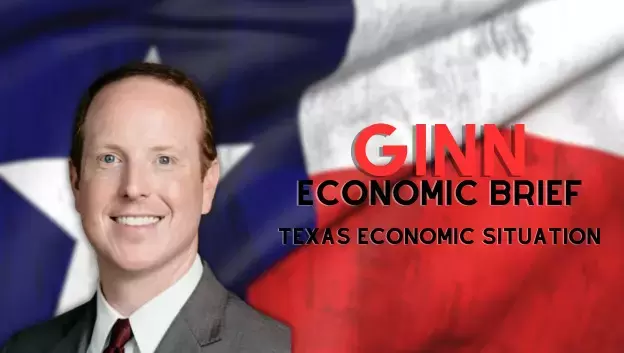

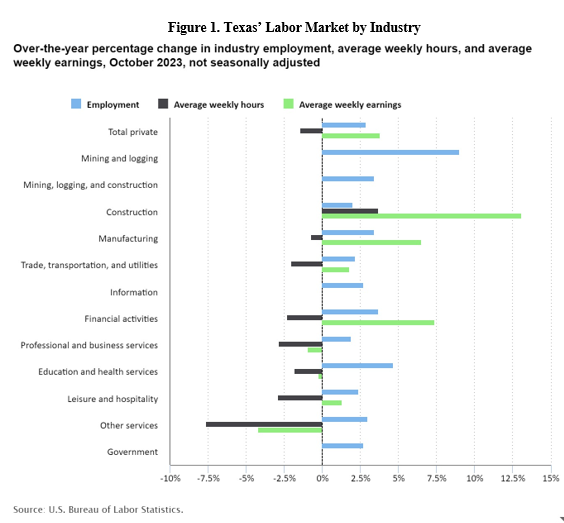
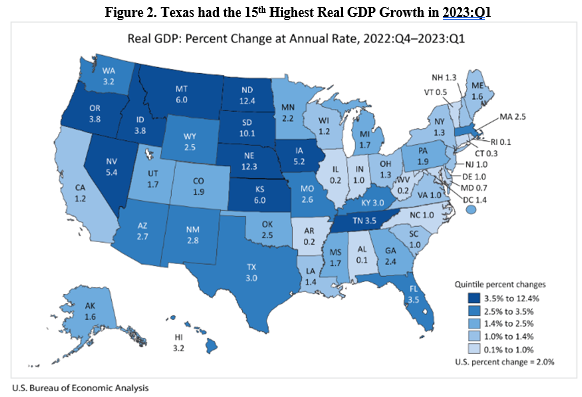
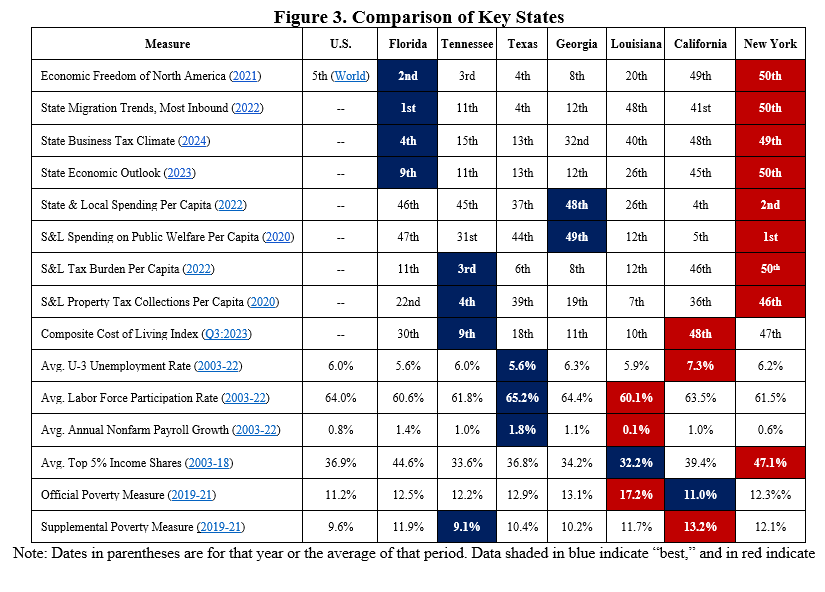

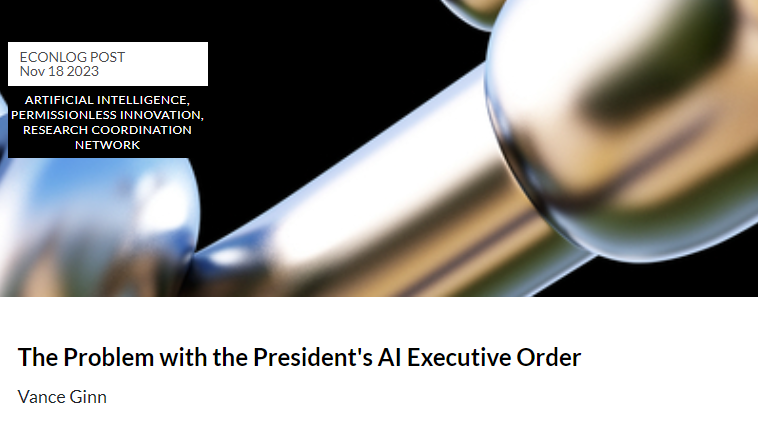






 RSS Feed
RSS Feed